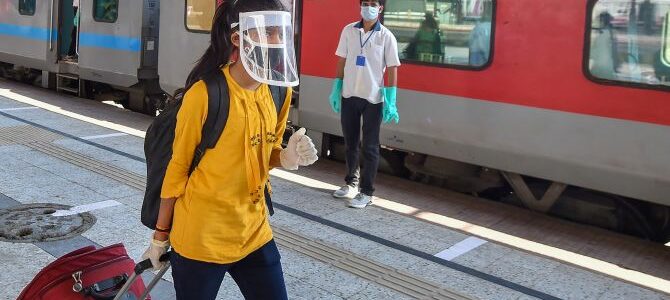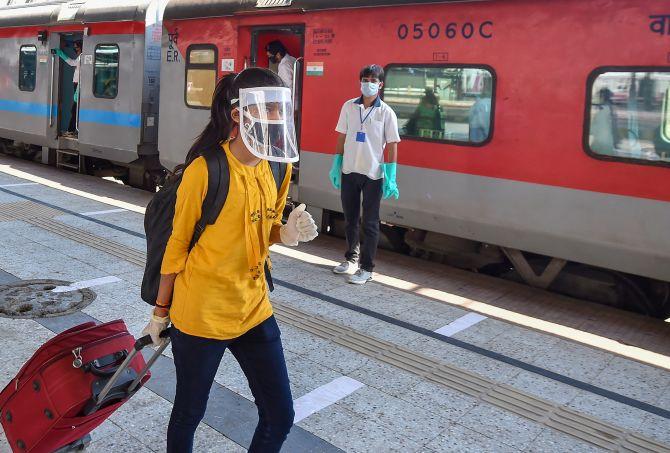
Railways not to cancel any more passenger trains
The Indian Railways has decided to not cancel any more passenger trains to accommodate more freight traffic for coal transport.
It will also gradually restore the ones it cancelled recently.
The national transporter is of the view that coal supply is now reaching normative levels and does not need any more special measures.
“Early data suggests that coal supply has stepped up since the passenger trains were cancelled.
“We introduced this as an interim measure, and are monitoring coal supply on a daily basis so that we can restore passenger trains as soon as possible.
“Since the announcement, we have already restored three pairs (six trains). Further steps will be taken keeping in mind the demand,” G K Bansal, executive director at Indian Railways told Business Standard, adding that the railways see no further need to cancel more trains as of now.
The Indian Railways cancelled passenger trains to prioritise the supply of coal to thermal power plants (TPPs), the railways ministry is now looking to gradually restore these trains on a day-to-day basis.
The ministry of Railways on Friday cancelled 753 trips of 42 of mail/express and passenger trains to facilitate the movement of coal-ferrying trains in northern and south east central railway zones.
While cancellations in northern railway (NR) are up to May 8, those in south east central railway (SECR) will continue till May 24.
“We are taking all measures to prioritise coal supply in this time of need.
“As of now, movement of coal rakes is being prioritised over all other trains, including all passenger trains barring Rajdhani and Shatabdi express,” a senior ministry official said.
According to the National Power Portal, the current average coal stock at power units stands at 7.7 days — close to the critical level stock of seven days.
Several political leaders criticised the ministries of coal, power, and railways for not being able to anticipate the increased power demand and collectively plan for it.
“Despite the absence of a V-shaped recovery, and only a recovery in fits and starts, the government is totally unprepared to tackle the coal-rail-power crisis.
“As shortages persist and inflation rises, please brace for more hardships,” Congress leader and formner finance minister P Chidambaram said in a social media post.
Rahul Gandhi has also been attacking the central government for the power crisis, saying that small industries, poor, and critical sectors will suffer due to power outages.
In response, coal minister Pralhad Joshi called him a ‘fake astrologer’.
At an inter-ministerial meeting earlier this year, the coal ministry had asked railways to provide 441 rakes per day to meet peak demand during the summer.
On Thursday, railways loaded 427 rakes, carrying 1.62 million tonne (mt) of coal for the power sector.
Business Standard had earlier reported that the national transporter had expressed its inability to divert more coal rakes from non-power sectors as it would cause the infrastructure sector to suffer.
While coal demand generally peaks at this time of the year, experts believe that India’s strong economic rebound was an externality that made the power crisis severe this time, coupled with high prices of imported coal.
As economic activity gained momentum, many sectors naturally needed more power consumption, a sector expert said.
Sources in the railways ministry also indicated that they’ve been raising the issue of delays and demurrages in coal loading and unloading with the concerned stakeholders.
The national transporter is also looking to acquire 6,000 wagons in this financial year which will solely be used for coal transportation, Bansal said.
The Railways recently floated a tender for 90,000 wagons, for which procurement is expected to begin in the later stages of this fiscal.
“Most of these wagons will be operational by the time peak coal demand for the power sector hits next year.
“With this procurement, we’ll have an additional capacity of 102 rakes.”
Meanwhile, the influx of wagons from already placed orders is also likely to start soon, he said.
Experts say that along with rolling stock inventory, decongestion of tracks through dedicated freight corridors will also help the national transporter ferry more coal and other materials in the coming time.
Source: Read Full Article
